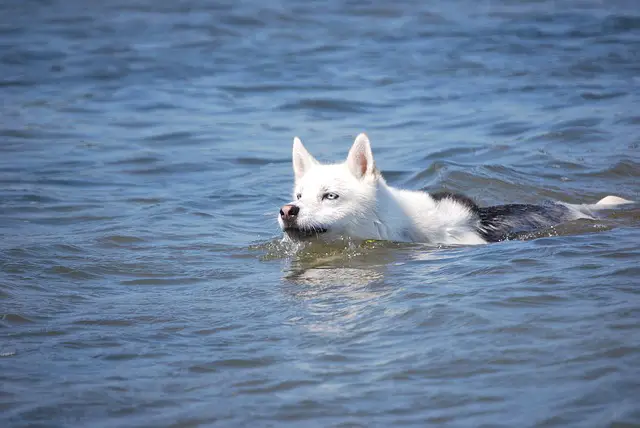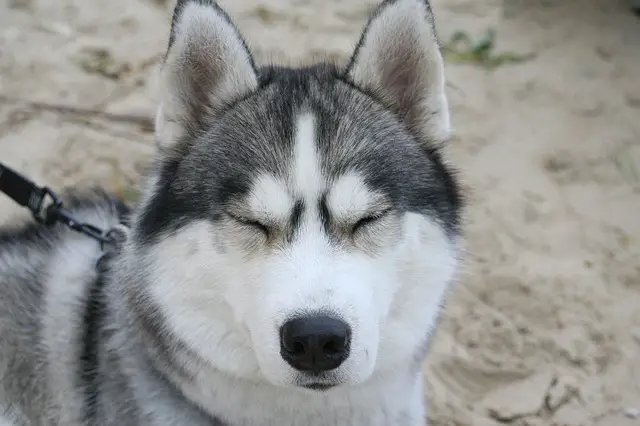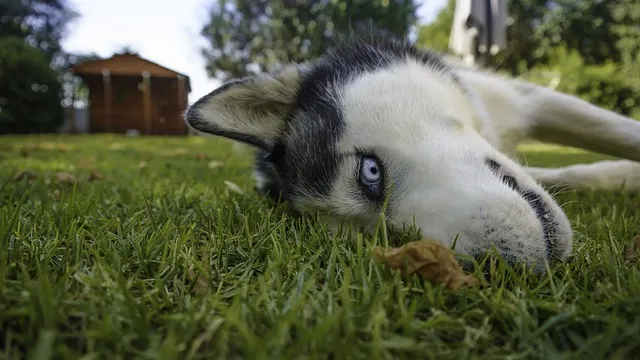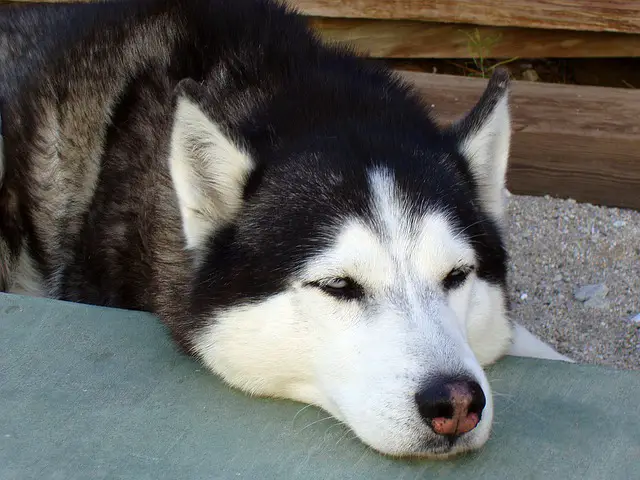The Siberian Husky is an exuberant, energetic, and all-around jovial breed of dog that makes an excellent family pet.
This is especially so for an active family that enjoys plenty of outdoor fun since the husky is a descendant of a long line of sled dogs and needs and enjoys exercise, especially in cold weather.
The Siberian husky is a relatively healthy breed of dog, but being purebred, they are more prone to health problems and diseases than mixed breed dogs and many are hereditary.
Breeders generally keep a close watch for any diseases in their breeding dogs, having dogs tested for genetic abnormalities and issues they could pass on and keeping good records.
If you are considering a breeder, shop around and use a reputable one. A good breeder will allow you to tour their facilities, answer any questions, and have available records to back up their information.
Although huskies are a healthy breed there are some diseases and health problems they are more susceptible to.
Contained in the following post is information about Siberian husky common health problems as well as older age husky health problems for the senior husky.

For your dog’s vitamin supplement, food, toys, or other dogs product please visit the Sundays for dogs website.
Siberian Husky Common Health Problems
While the Siberian husky is one of the healthiest breeds of dogs and can live in the range of 12 to 14 years, there are some health problems that are common in this breed. In this section, I will include more of these common ailments.
Ocular Conditions
Huskies are prone to a few eye disorders. All that are listed are hereditary and have tests that can be performed on both parents and puppies to determine if they carry these diseases.
Ask your breeder if parents have been tested and registered with the CERF (Canine Eye Registry Foundation). If tested, your breeder should have certificates for their dogs.
Juvenile Cataracts
Of the eye disorders, juvenile cataracts are the most common and can affect huskies by three months of age rapidly leading to blindness. Husky puppies will have clouded eyes just as with senior cataracts and reduced vision.
Puppies can quickly go blind or loss of sight may be gradual. The only option is surgery and which is costly at $2000 or more. Dogs can adapt to blindness, but their quality of life would be somewhat diminished.
Corneal Dystrophy
Siberian Huskies have a higher risk for corneal dystrophy than other breeds. The telltale sign on the cornea is white dots which can cause filmy clouded vision. Corneal dystrophy will not cause blindness but there are no treatments at this time or cure.
Skin Conditions
Huskies can suffer from skin ailments some are caused by environmental or food allergies and others from an underlying condition or may be genetically based. These issues may lead to itching, scratching, fur loss, and often infection.
Follicular Dysplasia
Follicular dysplasia is another common condition seen in Siberian huskies which has a genetic basis.
This causes alopecia or hair loss, and skin that may become infected in patches with symptoms surfacing around three or four months in husky puppies.
There is no treatment or cure but veterinarians usually recommend antimicrobials, shampoos, or topical medicated ointments.
Canine Lupus
Discoid lupus erythematosus is an autoimmune disease that can affect your husky’s skin. Symptoms usually begin with areas around the nose becoming light in color due to a lack of pigment with ulcers forming and bleeding.
Often these lesions spread to other areas. Lupus is diagnosed with a biopsy of the affected area.
Because discoid lupus is a disease of the immune system, it is treated with drugs called immunosuppressants, that “suppress” or calm down the immune system. Antibiotics and topical steroid creams may also be needed as well.
UV rays from the sun tend to make this condition worsen, so it’s best to keep your pup out of bright sunlight. If this is not treated it can lead to skin cancer.
“Snow Nose”
This is actually a harmless health issue that can be confused with discoid lupus. In winter, huskies are known to lose pigment in their muzzle and nose, giving the name “snow nose.” If this doesn’t resolve, however, have your husky checked to ensure it’s nothing more serious.
Zinc Deficiency
Siberian huskies as well as other types of sled dogs are prone to zinc deficiency. Their diets in the Great Northwest consisted of mainly fish which contain hefty amounts of vitamin A and of course, zinc.
Your husky may already be eating fish-based food, but still may not be getting enough zinc.
If they have symptoms of fur loss with itching and scratching, check with your veterinarian for a blood test to check zinc levels.
Your pup may need supplements of zinc or the addition of shellfish or oily fish like salmon, sardines, mackerel, or herring.
Pyoderma
Pyoderma is a skin infection that can be fungal or bacterial. Your husky may suffer from this due to anything that irritates skin such as allergies (environmental or food), hot spots, dry skin, etc.
An infection can occur from constant itching and scratching caused by irritants or disease.
Pyoderma is treated with one or more antibiotics, antifungals, topical or oral steroids, or medicated shampoos. Treatment depends on the cause and also which type of infection they have.
To check your husky’s health status or their DNA checks, please visit the Embark vet website for all the help you may need.
Common Medical-Based Health Conditions

Epilepsy
Epilepsy is startlingly common in Siberian huskies. Epilepsy causes seizures and it can sometimes be difficult to pinpoint the exact cause. Seizures can be hereditary in nature or caused by malabsorption and zinc deficiency.
As stated above, huskies often don’t get enough zinc, but they also don’t absorb zinc well either. Studies have shown that a zinc deficiency in the brain can lead to seizures.
Replacing zinc, if the cause, or placing your husky on phenobarbital would be two treatments for epilepsy.
Hypothyroidism
This is a common disease among sled dogs. When their thyroid is not producing enough thyroid hormone or thyroxine, this throws off your husky’s whole metabolism.
Huskies usually do have lower thyroxine levels than other breeds. This can cause lethargy, weakness, weight gain, loss of fur, and even seizures.
Once hypothyroidism is diagnosed, your pup will take a daily tablet of levothyroxine to replace the lost hormone and regulate metabolism.
Diarrhea
Because a Siberian husky’s original food source was the blubber of whales and seals, they do not do well on dog food that is grain-based.
Feeding them regular dog food often causes digestive upset leading to diarrhea. Overfeeding can also cause this. A diet based on fats (healthy) and proteins is preferred especially if the source is fish.
Heatstroke
Siberian huskies are susceptible to heatstroke because of the ample fur they are endowed with and living in a warm climate or in the summertime.
When the weather is hot and humid, make sure your pup has plenty of water, stays in air conditioning, if possible, and exercises early in the morning or after the sun has set.
Possible Siberian Health Problems that Aren’t Common

PRA (Progressive Retinal Atrophy)
Progressive retinal atrophy is an eye condition that sometimes affects Siberian huskies and is genetic in nature.
The first symptom is night blindness, with your husky having trouble seeing in the dark. Eventually your husky will become blind, but it’s a gradual process.
There is no treatment or cure for this but dogs usually do quite well acclimating to sightlessness.
Glaucoma
When fluid cannot drain in a natural way, it builds up and creates pressure, damaging the optic nerve and eventually causing loss of sight.
Glaucoma is very painful. If this is diagnosed at an early stage treatments like eye drops are available to slow progression.
Hip Dysplasia
Hip dysplasia is not common in Siberian huskies but is possible. Hip dysplasia is caused by a deformed femur ball that doesn’t fit into the hip socket well, causing grinding and wearing away which leads to pain, arthritis, and eventual lameness.
Parents of husky puppies should still be screened and have a certificate that your breeder should show you as this is a hereditary condition.
Older age Siberian Husky Problems

Usually taking your husky to their veterinarian once a year is sufficient unless they have health issues, but once they reach seven years of age they should visit more often.
Your husky will enter their senior years around seven and should be screened for senior conditions at this time.
Blood screening should be performed as well as any other testing your veterinarian recommends.
A few conditions that senior huskies are prone to are: arthritis, hypothyroidism, hypertension (high blood pressure), liver disease, and cataracts (senior).
Heart disease and diabetes can also pose problems especially if your husky has become more sedentary and packed on a few pounds, just as with humans.
Catching any of these conditions early can help your husky transition into its elder years comfortably.
Change your husky’s food to a senior diet at this time and still make sure they get proper exercise.
If arthritis is an issue, pain meds or holistic remedies can help them exercise with ease of pain. A more supportive dog bed is also a good idea to soothe and cradle their bones and joints.
Your husky will slow down as they age. Keep up with their medical care and follow their lead where exercise is concerned.
Your Siberian husky may be healthy and energetic their whole life. Hopefully, they won’t be plagued by any of the conditions above, but if your husky shows any signs or anything out of the ordinary, your husky’s veterinarian is the best source to turn to.